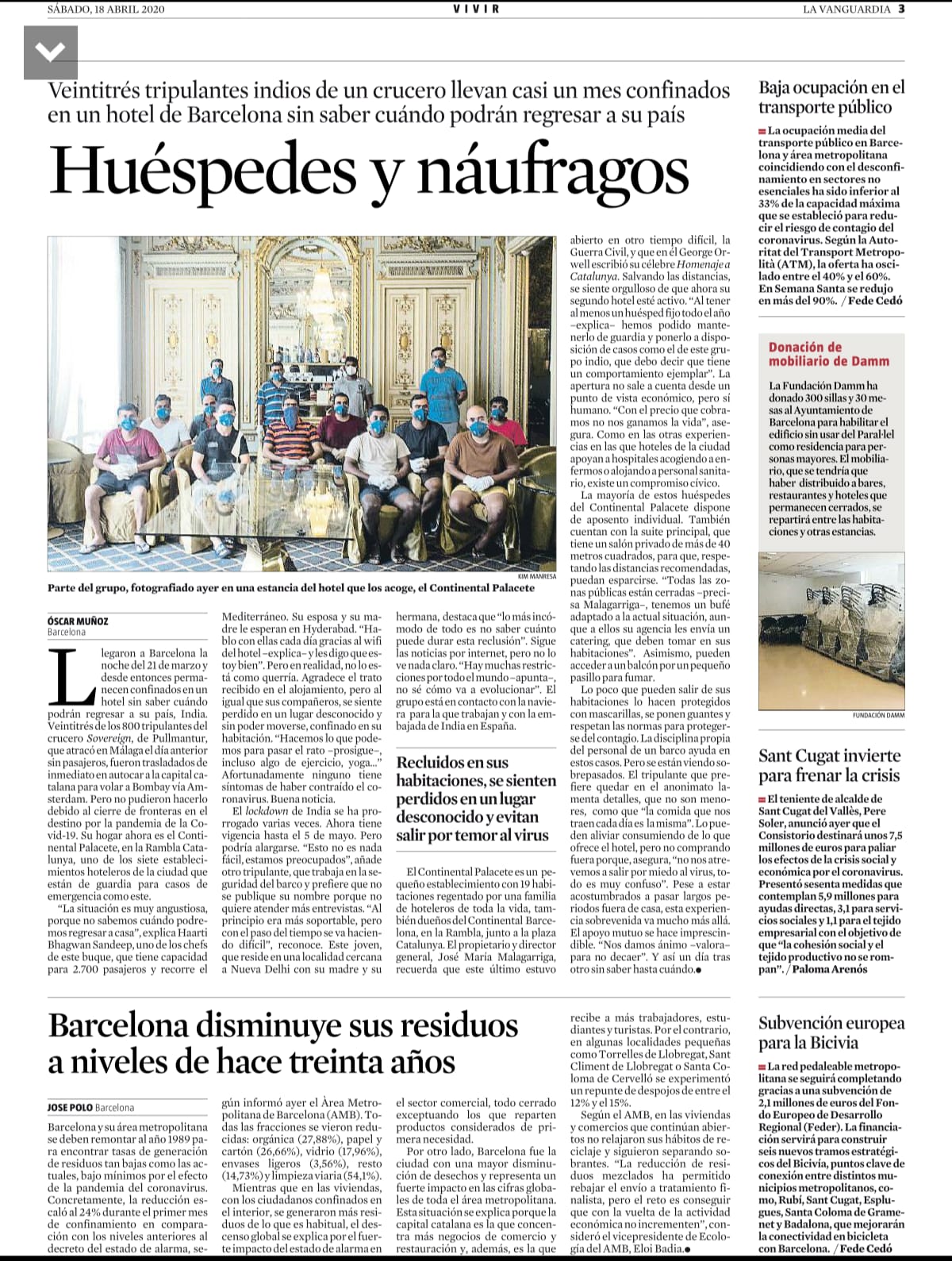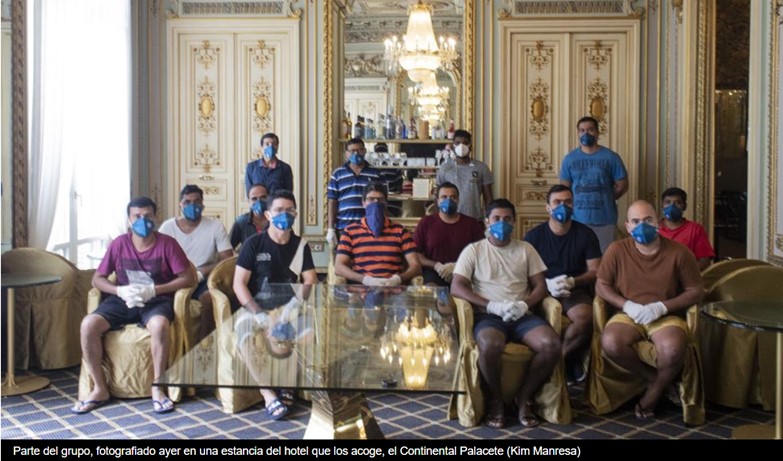Thank you Oscar Múñoz, journalist at La Vanguardia for spreading the story
Following to our previous post “Homage to our confined dear guests from India”, La Vanguardia was interested in our history and decided to publish an article to share the history of these “Guests and Shipwrecked” forced to remain confined in our Hotel Continental Palacete.
We reproduce here the article, prepared by the journalist Oscar Muñoz, whom we thank for his exquisite treatment and the quality of the article that was published on April 18, 2020. You can see the original publication here.

Twenty-three Indian crew members, confined for almost a month in a hotel in Barcelona
“The situation is very distressing, because we do not know when we can return home,” says one of the ship’s chefs.
They arrived in Barcelona the night of March 21 and since then they have been confined in a hotel without knowing when they will be able to return to their country, India. Twenty-three of the 800 crew of Pullmantur’s Sovereign cruise ship, which docked in Malaga the day before without passengers, were immediately transferred by coach to the Catalan capital to fly to Bombay via Amsterdam. But they were unable to do so due to the closure of borders at the destination by the Covid-19 pandemic. His home is now the Continental Palacete, on the Rambla Catalunya, one of the seven hotel establishments in the city that is on call for emergencies like this.
“The situation is very distressing, because we do not know when we will be able to return home,” explains Haarti Bhagwan Sandeep, one of the chefs on this ship, which has a capacity for 2,700 passengers and travels the Mediterranean. His wife and mother are waiting for him in Hyderabad. “I talk to them every day thanks to the hotel’s Wi-Fi,” he explains, “and I tell them I’m fine.” But in reality, it is not as you would like. He is grateful for the treatment received in the accommodation, but like his companions, he feels lost in an unknown place and unable to move, confined to his room. “We do what we can to hang out,” he continues, “including some exercise, yoga …” Fortunately, none have symptoms of having contracted the coronavirus. Good news.
Secluded in their rooms, they feel lost in an unknown place and avoid going out for fear of the virus.
India’s lockdown has been extended several times. It is now valid until May 5. But it could lengthen. “This is not easy, we are concerned,” adds another crew member, who works in the safety of the ship and prefers that his name not be published because he does not want to attend more interviews. “At first it was more bearable, but over time it becomes difficult,” he admits. This young man, who lives in a town near New Delhi with his mother and sister, highlights that “the most uncomfortable thing of all is not knowing how long this seclusion can last.” He follows the news on the internet, but he does not see anything clear. “There are many restrictions around the world,” he says, “I do not know how it will evolve.” The group is in contact with the shipping company they work for and with the Indian embassy in Spain.
The Continental Palacete is a small establishment with 19 rooms run by a family of longtime hoteliers, also owners of the Continental Barcelona, ??on the Rambla, next to Plaza Catalunya. The owner and CEO, José María Malagarriga, recalls that the latter was open in another difficult time, the Civil War, and that George Orwell wrote his famous Tribute to Catalonia. Going the distance, he is proud that his second hotel is now active. “By having at least one permanent host throughout the year,” he explains, “we have been able to keep him on guard and make him available to cases like that of this Indian group, which I must say has exemplary behaviour.” Openness does not pay off from an economic point of view, but a human one. “With the price we charge we do not earn a living,” he says. As in the other experiences in which city hotels support hospitals by welcoming the sick or hosting health personnel, there is a civic commitment.
Most of these guests at the Continental Palacete have their own room. They also have the main suite, which has a private room of more than 40 square meters, so that, respecting the recommended distances, they can be spread out. “All public areas are closed,” says Malagarriga, “we have a buffet adapted to the current situation, although their agency sends them catering, which they must take in their rooms.” They can also access a balcony through a small hallway for smoking.
What little they can get out of their rooms makes them protected with masks, they put on gloves and respect the rules to protect themselves from contagion. The discipline of the ship’s personnel helps in these cases. But they are being overwhelmed. The crew member who prefers to remain anonymous regrets details, which are not minor, such as that “the food they bring us every day is the same.” They can alleviate it by consuming what the hotel offers, but not buying outside because, he says, “we don’t dare to go out for fear of the virus, everything is very confusing.” Despite being used to spending long periods away from home, this unexpected experience goes much further. Mutual support is essential. “We give ourselves courage,” he values, “so as not to decline.” And so day after day without knowing until when.


